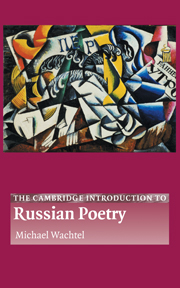Book contents
- Frontmatter
- Contents
- Preface
- Acknowledgments
- Note on translations and transliterations
- Introduction
- Part I Concepts
- Part II Interpretation
- Chapter 4 From the ode to the elegy (and beyond)
- Chapter 5 The ballad
- Chapter 6 Love poetry
- Chapter 7 Nature poetry
- Chapter 8 Patriotic verse
- Conclusion: poetry and pattern
- Bibliography
- Suggested further reading
- Index of poetic terms
- Index of names and works
Chapter 5 - The ballad
Published online by Cambridge University Press: 05 June 2012
- Frontmatter
- Contents
- Preface
- Acknowledgments
- Note on translations and transliterations
- Introduction
- Part I Concepts
- Part II Interpretation
- Chapter 4 From the ode to the elegy (and beyond)
- Chapter 5 The ballad
- Chapter 6 Love poetry
- Chapter 7 Nature poetry
- Chapter 8 Patriotic verse
- Conclusion: poetry and pattern
- Bibliography
- Suggested further reading
- Index of poetic terms
- Index of names and works
Summary
Немо́лод о́чень ла́д балла́д,
но е́сли слова́ боля́т
и слова́ говоря́т про то́, что боля́т,
молоде́ет и ла́д балла́д.
Маяковский, «Про э́то»The ballads' tune is very old
but if words hurt
and words speak about what hurts,
even the ballads' tune becomes young.
Mayakovsky, “About That”The Russian eighteenth-century odists quarreled about virtually every aspect of versification and poetic language, but they were unanimous in their conviction that poetry was a noble endeavor that deserved the attention of a cultivated public. They attempted to codify their views in treatises so that a sufficiently educated individual, by following their clearly defined rules, could become a poet. The greatest impediment to poetry was a lack of knowledge, for nothing of worth could be produced by an unenlightened mind. Such presuppositions ensured that these poets dismissed the Russian folkloric tradition as crude and barbaric. Even the exceptional and eccentric Trediakovsky, who made the exaggerated (and largely inaccurate) claim in a treatise of 1735 that his versification system was based on native folklore, did not dispute these unschooled poets' “lack of skill.” More to the point, his statement was so out of keeping with the general sentiment of the time and provoked such derision among his contemporaries that Trediakovsky himself omitted it when he republished his treatise in a “corrected” version.
Throughout the eighteenth century, then, folklore – to the extent that it attracted attention at all – existed on the periphery of serious poetry.
- Type
- Chapter
- Information
- The Cambridge Introduction to Russian Poetry , pp. 81 - 94Publisher: Cambridge University PressPrint publication year: 2004

